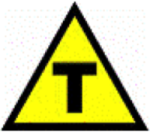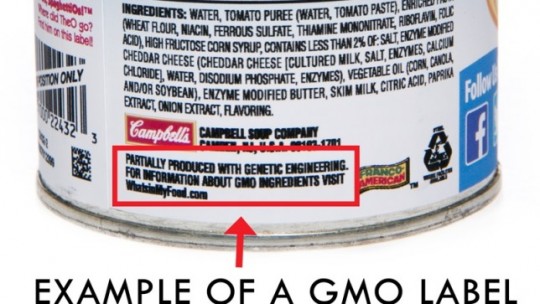
Big Corn, Big Lies
- Big Corn releases new study full of labelling and cost exaggerations
- GMO labelling will allegedly cost American families $1,050 annually, but one proactive company proves this to be wrong
- The DARK Act is back! Do your part to stop it!
Dear Reader,
Big Corn is back at it…
But this time they aren’t just filling our food supply with garbage food — they are now filling our news streams with garbage science.
What’s even more frightening…
The Dark Act is back in the Senate. If Big Corn gets their way and the act passes, our food supply will continue to be an endless stream of unlabeled GMO products.
But this doesn’t have to be the case. You have the power to stand up to Big Corn’s agenda.
Below I explain the lies… and what you can do about it.
![]() A Garbage Study
A Garbage Study
A new study funded by Big Corn — the same folks who call high fructose corn syrup natural — claims labelling food containing GMO ingredients will cost the foods industry a shocking $81.9 billion.1
In fact, Big Corn goes on to report that when Vermont’s new GMO labelling law goes into effect on July 1, it will cost each American family an additional $1,050 annually and increase average national food prices by 1.76 percent in the first year.1
But what Big Corn doesn’t tout as loudly is the flaws in their study.
Let me explain…
This “study” makes grandiose assumptions about how the food industry will react to the new GMO labelling law.
Instead of calculating the minute costs of adding new text to food packaging, Big Corn hypothesizes that all food makers, regardless of their sales territories or location, will instead reformulate their products using non-GMO ingredients so they can sell them as non-GMO foods in Vermont.
These reformulation costs are how the corn industry came to the inflated conclusion that American families will lose $1,050 from their budgets in coming years.
One American food giant has already debunked this bloated figure. We will explore how they did this in a bit.
First, let’s take a closer look at the inflated claims Big Corn is making about GMO labelling.
![]() The Big Corn Way: Labelling Lies as Facts
The Big Corn Way: Labelling Lies as Facts
The authors of the study claim this reformulation is due to consumers being less likely to purchase a product containing GMO ingredients.
However, there is research to combat Big Corn’s ridiculous claim.
A recent study by two U.S. Department of Agriculture economists shows that food choices at the grocery store are just as impulsive in countries requiring food labelling. It went on to report factors like price and calorie content were of more importance.2
Another study done by two agricultural economists found that the presence of GMO labels didn’t increase consumer apprehension toward GMO products. In fact, one of the key findings of the study was, “There was no consistent statistically significant difference in the average level of concern for GMOs expressed by people shown different labels. That is, the mere presence of the GMO label did not lead to a greater level of concern about GMOs.3
In addition to these American findings, Brazil’s GMO labelling policy provides interesting information. The “transgenic” symbol was added to Brazil’s GMO food packaging 15 years ago (2001), yet studies find that consumers are more apt to buy foods in packaging containing this label than those that do not contain the label, particularly if they make nutritional claims. 4

Brazil’s transgenic symbol Photo credit: www.loc.gov
Big Corn goes on to claim that many food producers will opt to make two versions of their products — one that contains GMO ingredients and a non-GMO ingredient version. This two-version production model is also a factor in their outrageous $81.9 billion estimate.
However, Vermont’s law only requires GMO products to have a label, not to make changes to ingredients.
And as we have recently seen with Campbell’s Soup, multiple products are a very unlikely reality.
Campbell’s has not reformulated all of their products. Instead, they now indicate which products contain GMO ingredients.

Campbell’s Soup GMO labelling
Photo Credit: abcnews.go.com
And according to company spokesman Tom Hushen, Campbell’s decision to label has made no difference in cost to the consumer. He explains:
“To be clear, there will be no price increase as a result of Vermont or national GMO labeling for Campbell products.”5
So there you have it. Campbell’s has proven there is no $81.9 billion problem. They are proactively labelling GMO products, and yet there is no price increase for the consumer.
While Campbell’s is certainly a trailblazer in the food industry, unfortunately, they still don’t see GMO products as harmful. Hushen went on to report, “We still believe GMOs are safe and we continue to believe that they play an important role in feeding the world.”
While Campbell’s opinions about GMOs may differ from those of the Living Well team, we can still applaud them for their transparency about their ingredients and consumer costs, even if these actions are the result of consumer demand.
If food ingredients are of importance to you, oppose the Senate version of the “DARK” (Deny Americans the Right to Know Act) Act NOW!
The DARK Act will:
- Pre-empt states from requiring GMO labelling
- Make voluntary labelling of GMO products more difficult for companies like Campbell’s
- Remove the FDA’s jurisdiction over GMO disclosures.
If you would like to oppose the Dark Act, you can call your senators at the U.S. Capitol switchboard (202) 224-3121. Let them know you oppose the DARK Act and support GMO labelling!
You can also use the form at Environmental Working Group. They are a non-profit, non-partisan organization dedicated to protecting human health and the environment. Click here to access the form.
If you have any comments about GMO labelling or the DARK Act, drop me a line! Nmoore@lfb.org
Live well,

Natalie Moore
Managing editor, Living Well Daily
Sources
[1] Cost Impact of Vermont’s GMO Labeling Law on Consumers Nationwide
[2] Corn Lobby’s GMO Labeling Study “Preposterous”
[3] Chapter 11 The Effect of GM Labeling Regime on Market Outcomes
[4] Brazilians Don’t Turn Up Their Noses At GE Food
[5] Campbell’s Decision to Label GMOs Destroys Monsanto’s Main Argument Against Labeling
Written By Natalie Moore
Natalie Moore is a dedicated health researcher with a passion for finding healthy, natural, and science-based solutions. After a decade of direct healthcare experience in western and natural medicine, she was involved in public health research before joining Living Well Daily.
View More Free Articles
Stop Obsessing Over Diet Trends
Can we stop with the endless diet debates already? Every other week there’s a new headline shouting about which diet is best for weight loss, heart health, or diabetes. Paleo, keto, low-carb, high-protein… it’s exhausting. And now, a new meta-analysis is out comparing the Mediterranean diet, the DASH diet, and something called AHEI (that’s “Alternative...
A New Reason to Ditch Processed Junk
If you’ve ever walked the inside aisles of your local grocery store and thought, “This is all just junk,” your instincts were spot on. A new study published in the journal Thorax just added another red flag to the list of dangers linked to ultra-processed food—a 41 percent higher risk of lung cancer. That’s right....
When Being Winded on Stairs Is Serious (And When It Isn’t)
I had an athlete visit me recently because he experienced shortness of breath while climbing stairs. He is in great shape, so he was worried about what it might mean. “Doc,” he said, “I run five miles three times a week. Why am I huffing and puffing after two flights of stairs?” His concern is...
Study EXPOSES Hidden Danger Lurking in Your Car
We think of our homes and cars as safe havens. But according to a startling new study, they may be flooding your lungs with microscopic plastic particles—every single day. Researchers in France recently found that adults inhale an average of 68,000 microplastic particles daily from indoor air alone. To put that in perspective, that’s about...
Mailbag: Is Modern Food Making You Snore?
“What can cause snoring, and is there a way to correct this issue?” —Seeking Silence Hi Seeking, Snoring happens when the soft tissues in your throat relax and vibrate as air passes through during sleep. While several factors can cause snoring—from sleep position to nasal congestion—I want to share one trigger that might surprise you....
Simple Food Swap SLASHES Dementia Risk 28%
Let’s be honest… who would jump at the chance to cut their dementia risk by 28 percent. And no, you don’t need to run marathons, survive on broccoli, or learn to play the zither (whatever that is) to make it happen. All it takes is one easy swap—something that’s probably already in your refrigerator. Researchers...
This SMART Floss Exposes Hidden Health Danger
Scientists have created dental floss that doesn’t just clean between your teeth—it also tracks your stress while you’re flossing. Now, I know what you’re thinking… “Great—now even flossing is going to stress me out by telling me how stressed I am.” But this fascinating new tool from Tufts University could be a game-changer for understanding...
Is This "Safe" Sweetener Damaging Your Brain?
The headlines are alarming… “Popular Sugar Substitute Linked to Brain Cell Damage” and “Erythritol Could Damage Critical Brain Barrier” are just two of the dozens I’ve spotted recently. But before you toss every sugar-free product in your pantry, let’s take a closer look at what this study actually shows—and what it doesn’t. The latest research...
This Summer Threat Could SPIKE Your Blood Sugar
Picture this… It’s another scorching hot summer day. You crank up the air conditioning while watching the weather forecast, which predicts yet another “record-breaking” heat wave. It’s starting to feel like just another miserably uncomfortable summer. But what you might not realize is that—if you have diabetes—those rising temps could do far more damage to...
Move Over Yogurt—5 Foods That Pack MORE Probiotics
Let’s talk about your gut. The microbiome is the collection of trillions of bacteria and other tiny organisms that live in and on your body—especially in your gut—and help keep you healthy. I’ve written often about how vital it is to maintain a healthy microbiome. And you might have dutifully added yogurt to your shopping...









